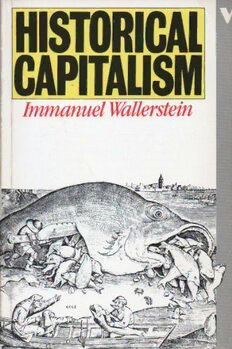
Historical Capitalism PDF
Preview Historical Capitalism
Immanuel W allerstein 4 Verso /H istorical Capitalism © Immanuel Wallerstein 1983 Verso Editions 15 Greek Street London W1 Filmset in Compugraphic Bembo by Comset Graphic Designs Printed by The Thetford Press Limited Thetford, Norfolk ISBN 0 86091 761 4 Pbk 0 86091 061 X Contents Introduction 7 The Commodification of Everything: Production of Capital 13 The Politics of Accumulation: Struggle for Benefits 47 Truth as Opiate: Rationality and Rationalization 75 Conclusion: On Progress and Transitions 97 Introduction . This book had its immediate origin in two successive requests. | In the autumn of 1980, Thierry Paquot invited me to write a ' > short book for a series he was editing in Paris. He suggested as my topic ‘Capitalism’. I replied that I was, in principle, will- I ing to do it, but that I wished my topic to be ‘Historical ■ Capitalism’. , I felt that much had been written about capitalism by Marx- ■, ists and others on the political left, but that most of these books suffered from one of two faults. One variety were basic- r ally logico-deductive analyses, starting from definitions of what capitalism was thought to be in essence, and then seeing “ how far it had developed in various places and times. A second variety concentrated on presumed major transformations of the capitalist system as of some recent point in time, in which the whole earlier point of time served as a mythologized foil I .f against which to treat the empirical reality of the present. What seemed urgent to me, a task to which in a sense the whole corpus of my recent work has been addressed, was to • see capitalism as a historical system, over the whole of its history and in concrete unique reality. I, therefore, set myself the task of describing this reality, of delineating precisely what was always changing and what had not changed at all (such that we could denote the entire reality under one name). 8 I believe, like many others, that this reality is an integrated whole. But many who assert this view argue it in the form of an attack on others for their alleged ‘economism’ or their cultural ‘idealism’ or their over-emphasis on political, ‘volun- taristic’ factors. Such critiques, almost by their nature, tend to fall by rebound into the sin opposite to the one they are at tacking. I have therefore tried to present quite straight forwardly the overall integrated reality, treating successively its expression in the economic, political, and cultural-ideo- logical arenas. Shortly after I agreed in principle to do this book, I received an invitation from the Department of Political Science at the University of Hawaii to give a series of lectures. I seized the opportunity to write this book as those lectures, given in the spring of 1982. The first version of the first three chapters was presented in Hawaii, and I am grateful to my lively audience for their many comments and criticisms which enabled me to improve the presentation considerably. One improvement I made was to add the fourth chapter. I realized in the course of the lectures that one problem of exposition persisted: the enormous subterranean strength of the faith in inevitable progress. I realized too that this faith vitiated our understanding of the real historical alter natives before us. I, therefore, decided to address the question directly. Finally, let me say a word about Karl Marx. He was a monumental figure in modern intellectual and political history. He has bequeathed us a great legacy which is concep tually rich and morally inspiring. When he said, however, that he was not a Marxist, we should take him seriously and not shrug this aside as a bon mot. Introduction 9 He knew, as many of his self-proclaimed disciples often do not, that he was a man of the nineteenth century, whose vi sion was inevitably circumscribed by that social reality. He knew, as many do not, that a theoretical formulation is only understandable and usable in relation to the alternative for mulation it is explicitly or implicitly attacking; and that it is entirely irrelevant vis-a-vis formulations about other problems based on other premisses. He knew, as many do not, that there was a tension in the presentation of his work between the exposition of capitalism as a perfected system (which had never in fact existed historically) and the analysis of the con crete day-to-day reality of the capitalist world. Let us, therefore, use his writings in the only sensible way—that of a comrade in the struggle who knew as much as he knew.
